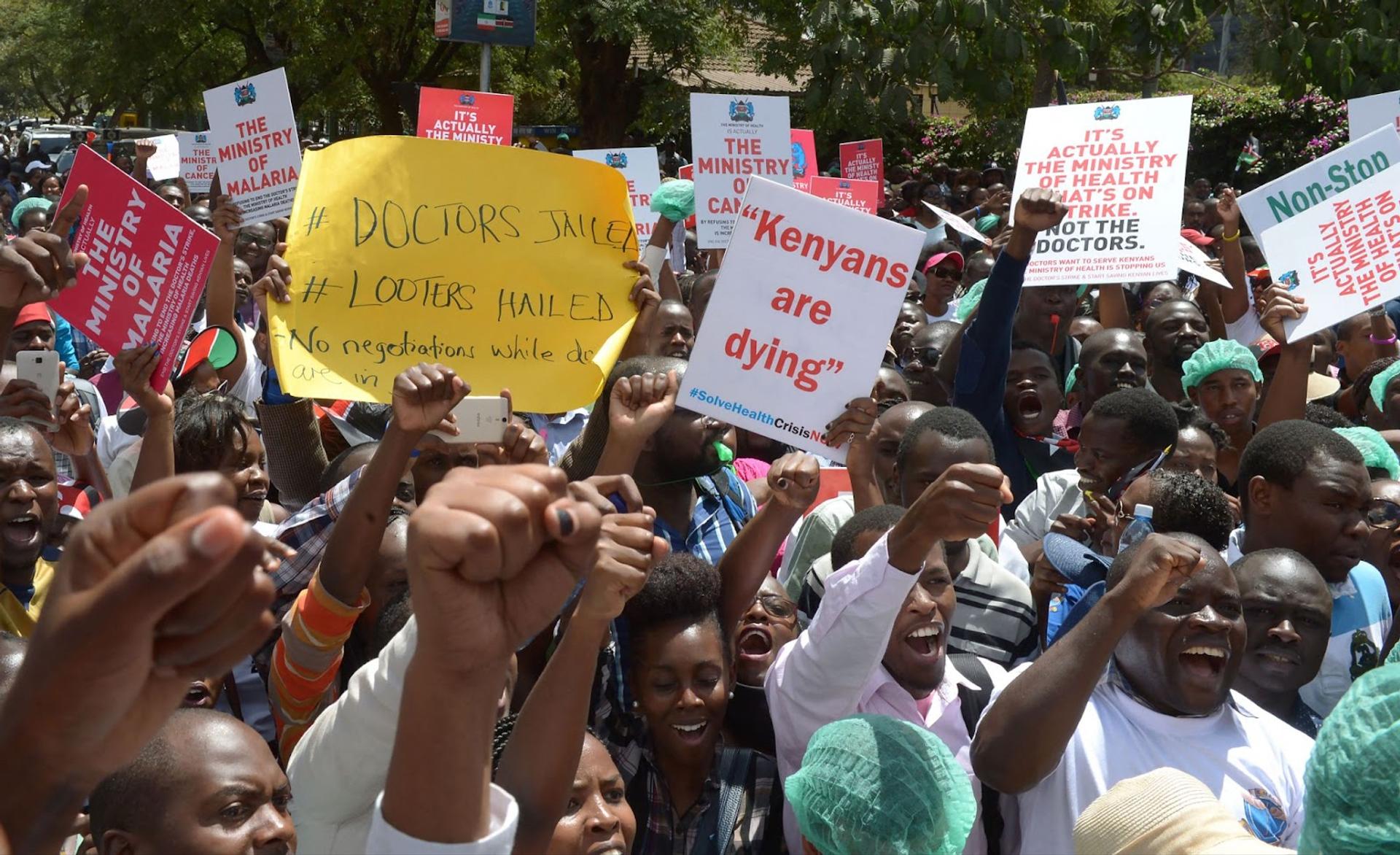The News
A strike by doctors in Kenya has laid bare an unemployment crisis in which qualified medical graduates are struggling to get jobs, despite staff shortages at public hospitals, due to the government’s budget shortfalls.
The walkout, now in its third week, comes as Kenya faces potential funding constraints due to a rising debt repayment burden, according to the country’s parliamentary budget office. Some 4,000 public sector doctors are on strike, said the Kenya Medical Practitioners Pharmacists Dentists Union (KMPDU), which is nearly half of the country’s roughly 9,000 registered doctors.
The union wants the government to hire over 3,000 medical interns who are currently unemployed. But the health ministry said it lacks the resources to recruit them and in March requested 4.9 billion Kenyan shillings ($37.7 million) from the treasury to do so. It means that despite a policy requiring the government to place medical interns within 30 days of completing their studies, graduates remain jobless long after qualifying to practice medicine.
Know More
The union has accused the government of dragging its feet for years on the implementation of an agreement signed in 2017 that, among other things, sets medical interns’ salaries at 206,000 Kenyan shillings ($1,566) per month and fast tracks their clearance to work at health facilities upon graduation.
“They (government) are taking us in circles with no plan to address these issues,” Dr. Davji Atellah, secretary general of the KMPDU told Semafor Africa. “They have not prioritized the health workforce.”
Health Cabinet Secretary Susan Nakhumicha told reporters in March that the internship challenge pointed to “a bigger conversation about health care financing.”
The government wants the doctors to suspend the strike as negotiations proceed,as per a court order, but the union has refused to back down. The situation worsened on Monday (April 1) when clinical officers, primary health care providers who had been helping keep hospitals running in the absence of doctors, also launched a nationwide strike.
Martin’s view
The impact of the strike has been devastating, with most patients being turned away from public health facilities or left unattended. Many Kenyans have turned to alternatives including private hospitals and traditional medicine providers.
The strike is only a symptom of wider malaise that stems from severe budget constraints. At around 3.7% of its budget, Kenya’s spending on health falls short of the 5% recommended by the WHO for low and middle income countries to achieve universal health care, or the 15% it committed to spending on health as part of the Abuja declaration.
“It’s not just health. Because the country is spending much of its revenues on servicing debt, social spending and development spending is also squeezed,” noted Anderson Njuki, a Nairobi-based economist. “But I believe with better fiscal discipline and the right priorities it’s possible for the government to increase its health expenditure.”
Njuki argued that lack of opportunities for qualified Kenyan medical professionals would accelerate their migration abroad, as would poor remuneration.
The lack of jobs for qualified medics, coupled with other factors including the desire for better pay, could have a lasting impact for years to come by accelerating the migration of doctors out of the country and severely weakening Kenya’s public health system.
Resolving these issues is key to improving labor relations and strengthening the country’s health workforce. It will also be crucial for the success of President William Ruto’s flagship Universal Healthcare plan, which aims to improve healthcare access for Kenyans.
Room for Disagreement
The nurses union in Kenya has refused to join the strike, despite pressure to do so from a section of its members, saying it will pursue other approaches to resolve its issues with the government.
“The issues doctors are pushing are genuine and should be implemented…. the government is supposed to release funds to hire interns,” Kenya National Union of Nurses (KNUN) Secretary General Seth Panyako told a press conference in March. “But we’re not going on strike, we’re going to the courts.”
The View From South Africa
The South African Medical Association Trade Union (Samatu) last week warned that continued failure to hire doctors at state-owned hospitals was driving the migration of doctors out of the country. The union said more than 800 qualified doctors in public-health posts had not been hired due to funding constraints, despite staff shortages in public hospitals.
“Annually, the department cites budget constraints as a barrier to hiring qualified medical doctors, yet no substantial measures are evident to solve the funding dilemma,” the union noted in a statement. “This contributes immensely to the web of factors that prompt the continuous emigration of qualified doctors.”
Notable
- Kenya plans to fund a 326 billion Kenyan shilling ($2.5 billion) budget deficit by selling bonds in China, Japan, and the Middle East. The country is seeking to diversify its external sources of debt, reports Kenyan newspaper Business Daily.
